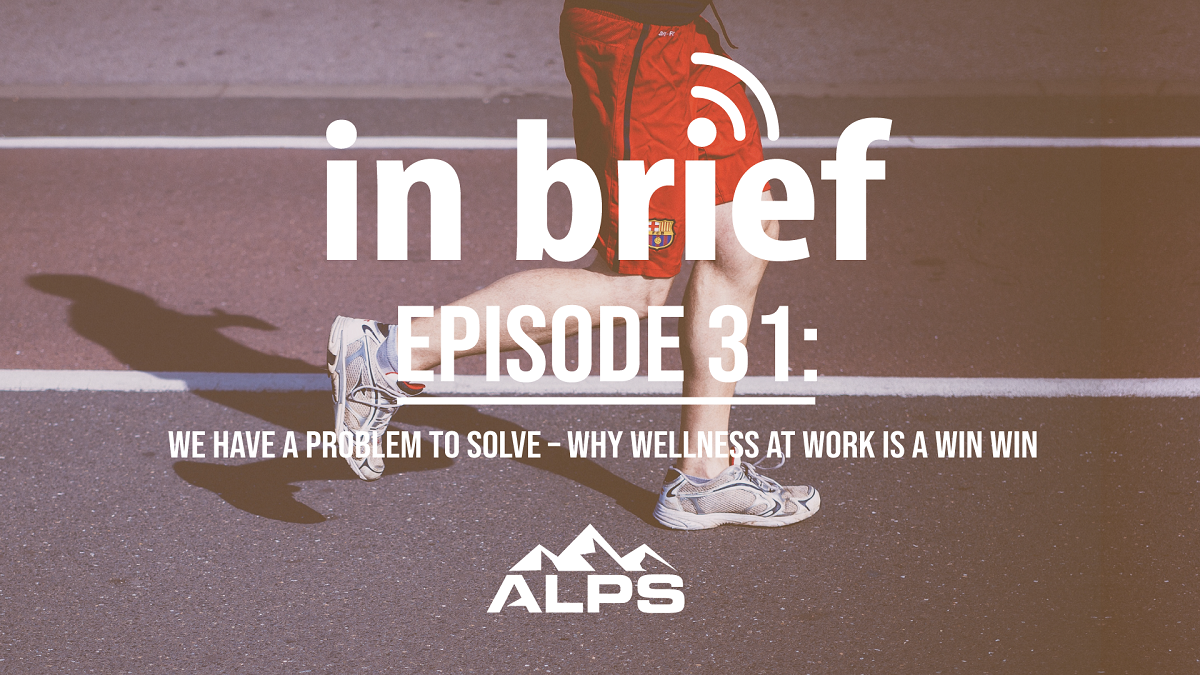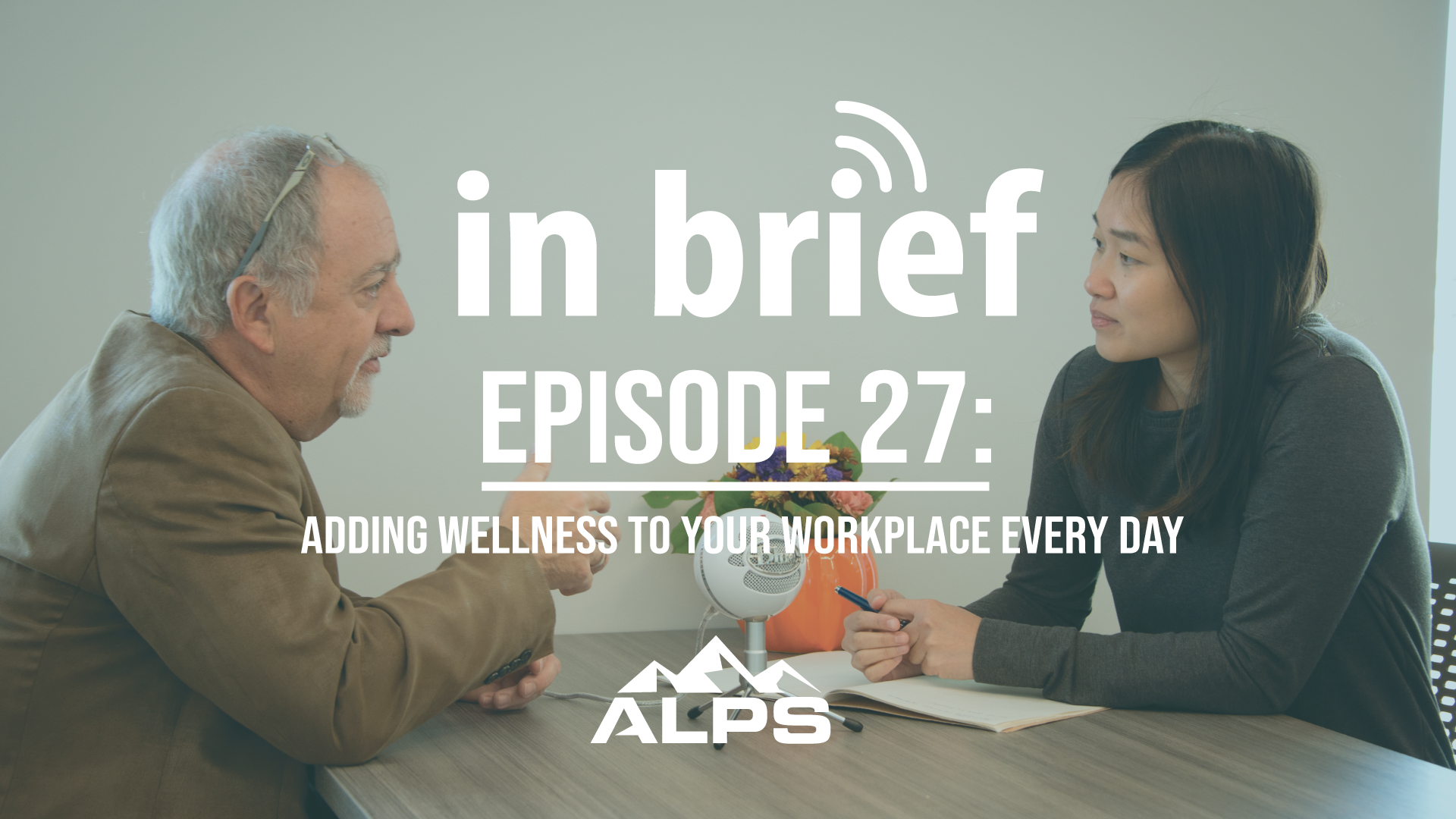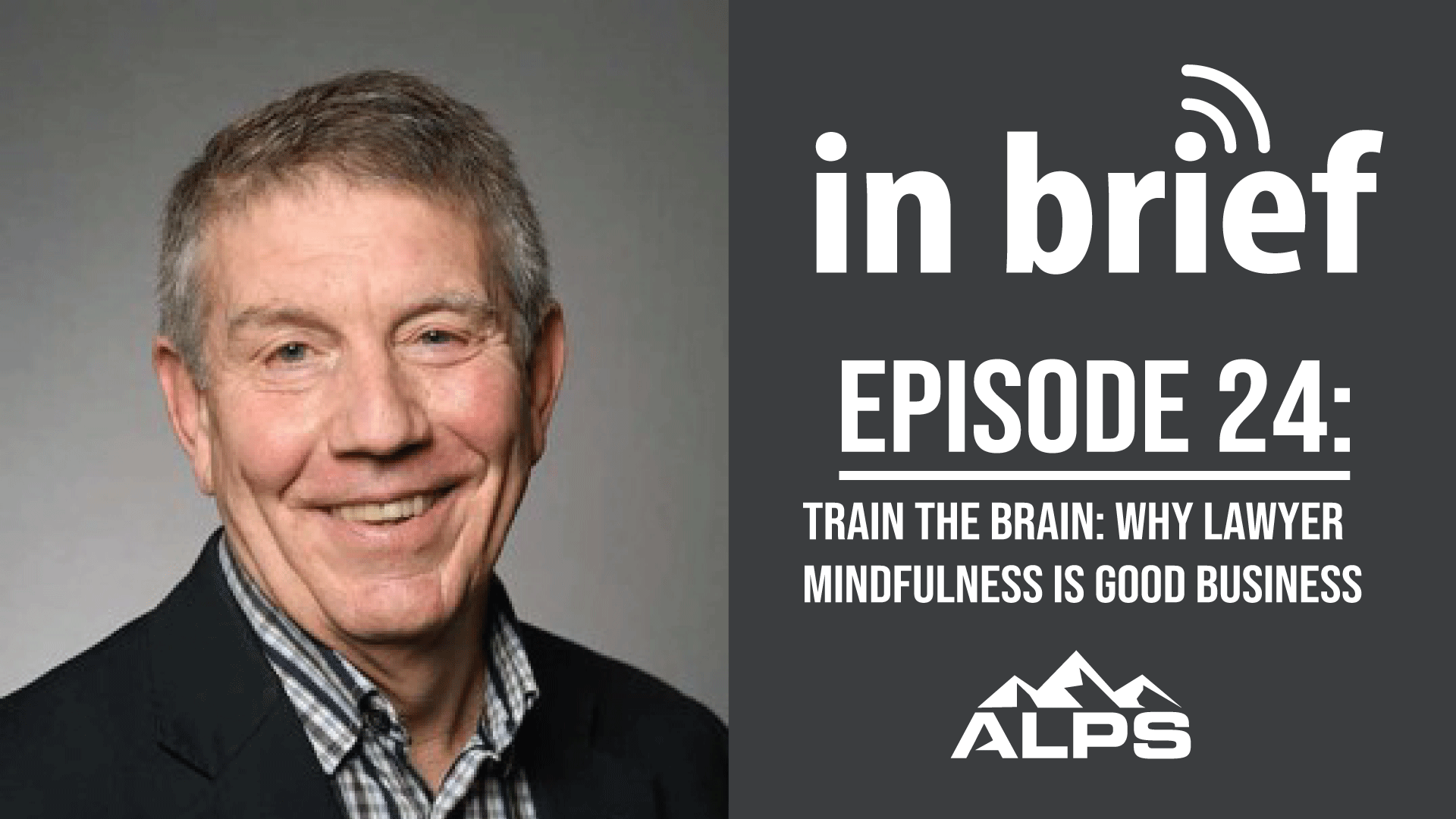7 min read
ALPS In Brief Podcast – Episode 27: Adding Wellness to Your Workplace Every Day
Start the new year off on the right foot, or the left foot. Incorporating wellness into your everyday workplace routine can be as easy as putting...
We've crafted solutions tailored to your firm
The world of insurance for law firms can be confusing, and difficult to navigate. We've created this glossary because these common insurance terms should be easy to understand.
12 min read
 Mark Bassingthwaighte, Risk Manager
:
Mar 14, 2019 12:00:00 AM
Mark Bassingthwaighte, Risk Manager
:
Mar 14, 2019 12:00:00 AM

Ready to make your health a priority in your law practice and daily worklife balance? Lauren Baptiste is partnering with ALPS for a 1-hour wellness webinar on May 15! Sign up now: “Why Making a Personal Wellness Pledge is Good for You and for Business”
We see malpractice claims result from failure to file a document or a missed deadline, but often the heart of those issues is that attorneys are stressed out, burned out, overworked, or suffering from an illness or addiction. Lauren Baptiste, founder of Acheloa Wellness, joins us today to discuss how these issues manifest in our work lives and how to conquer them to find our passions again.
Transcript:
MARK B:
Hello. This is Mark Bassingthwaighte, the risk manager with ALPS. Welcome to the latest episode of ALPS in Brief, the podcast that comes to you from the historic Florence building in beautiful downtown Missoula, Montana. I’m really excited about our guest today, Lauren Baptiste from New York. Lauren is very much involved in wellness, and as many of you know in our listening audience, wellness is a very, very significant issue in bars across the United States and certainly up [inaudible 00:00:47] by the ABA. Before we get into our conversation on wellness, Lauren, I’d love to take a little time and share some information about yourself.
LAUREN BAPTISTE:
Sure. Thank you for having me. My name is Lauren Baptiste, and I am the creative founder and CEO of Acheloa Wellness. This kind of came for me because I had been in public accounting for four years. Before we even talk about what it is, it’s really important that I share where I came from, because being in a Big Four, working crazy hours, is very relatable to a lot of the lawyers and the accountants and the other professionals that I work with. Being there for 10 years really empowered me to serve others in this way, knowing that we’re hard-working, professional, amazing people, but sometimes the one thing that we let go of is our wellness. That’s where my boutique firm came to life.
MARK:
Very good, very good. You’re working in this corporate setting and alongside attorneys. What are some of your big takeaways from that experience?
LAUREN:
It’s really interesting. Over 10 years you get to see a lot, so being there was such a wonderful experience of being able to understand really what makes us tick. At the forefront of it is stress. We all are trying to do our jobs and have quality work and feel good and do it all, right? Have the families, have the friends, have the social life, have the job, have the health, but really the health is the one that goes on the back burner. That’s what I saw so frequently, is that, we would let go of that, which is our essence. If we don’t have our health, we really don’t have anything. That’s really where I felt like, “Okay, there’s a problem to solve here.”
MARK:
Yes, yes. Oh, I couldn’t agree more. You’re the creative founder of a firm, [Ack-lea 00:02:47]? My apologies.
LAUREN:
Acheloa.
MARK:
Acheloa. There we go, thank you. I’m just struggling with this one this morning. It’s a very interesting word, Acheloa Wellness. What’s the history? What does this word mean?
LAUREN:
Achelois is a minor Greek goddess, and she focused on stress and burnout and pain. When I was finding a name for my company, I felt so called to that name, because I work with men, but I really specifically have an expertise in women’s hormonal health, so a lot of what I do nails into that area. As I was finding what name really served, Achelois was the muse behind my business, and so Acheloa just sounds a little bit nicer than Achelois [Well-neese 00:03:44], so that’s where I changed it slightly.
MARK:
I love that. That is great. Very cool, very cool. You talk about, you work with men and women, as I understand it here, but you’re also saying you primarily focus on women. Why is that?
LAUREN:
What I’ve seen in my experience is that, women internalize stress. Men can internalize it, but a lot more often they’ll keep it on the surface and it’s easier to move through them, but if we take it like a pill, this stress, what happens is it starts to eat us from the inside out. Something that will happen is, we don’t even notice it, but there’s subtle shifts in our mental state, and then in our physical bodies, that can be so subtle, so simple, as much as constipation or belching or something so simple, but it actually is the first stage of a longer term disease. If over time, we have continued gas in the body, or dry skin or maybe psoriasis, rosacea, or something like that, it can become a greater, more impactful disease on our body, which nobody wants. That’s why I’m here for preventative maintenance.
MARK:
Okay. In my experience, I’ve been a risk manager here with ALPS for over 20 years now, and have spent a lot of time presenting and working in terms of consulting with law firms and lawyers all over the country. One of the things that I lecture about is what I would call the true cause of malpractice. Attorney impairment is really behind quite a bit of this, and I broadly define that term in terms of stress, burnout, overwork, obvious things like depression, mental illness, addictions of a variety of types. I guess what I’m getting to with this is, it impacts an employee’s, or an attorney’s, or staff person, whoever’s impaired, it really does have an impact in the workplace setting. I guess with that in mind, and I think this is where you’re going but, why should law firms, in terms of the business, care about these issues? Am I on to something?
LAUREN:
Yeah, you are on to something, and I love that you brought it there. I think what happens is that, we see things on our bodies so easily. Like, “Oh, I have a mole,” or, “I have acne,” right? We all point to the things that we can touch and feel, but mental health is not that. We can’t just put your hand on depression or feel into anxiety, but what’s happening is that it’s there.
The more and more I speak with individuals in this arena, the more I hear these secrets of, like, “Yeah, I had depression for years and I didn’t tell anybody,” or, “Yeah, I’ve been on anxiety medication, that’s just my thing.” That’s where I’m like, “Wow.” There needs to be a conversation and I’m so happy that the ABA came out with their wellbeing campaign, which we can talk about in a little bit, but it really focuses on mental health being so important that we get in front of this. That’s where I feel so passionate about conquering stress, to start to overcome the issues of mental health that arise because of it.
MARK:
I’ve talked about, in terms of my world and working for a malpractice insurer, I see one of the costs of not addressing this, not being proactive, as exposure to malpractice claims. Why do you think dates get missed, as an example, on calendars, and documents don’t get filed? Depression is just one reason people can’t always just muster the energy to do it, sadly, but I suspect there are other costs. Do you have some thoughts? What is your experience, in terms of failing to address these kinds of issues?
LAUREN:
I think there’s a lot of ways you can look at it. I think the easiest way is to start with the self and say, “Okay, what is this costing me?” It’s important that we also understand what it’s costing us, because if we can’t get past ourselves, it’s hard to help others. If we start with ourselves, it can create a crack in the framework of our foundation of everything. If we’re really not in a stable place with our mental health, it of course will have an impact on your relationships with your spouse, with your family, with your coworkers. It will have an impact on your work, it will take longer for things to get done. You’ll likely be sick more, take more days out of the office. Your vacations won’t be as fulfilling or happy. There’s even a financial burden, just because we’re not sound in our mental health. It’s not just anxiety on its own. It’s like, your life will surround how your emotive state really is, and that’s just the individuals. We can go into the corporate and how that has a bigger impact.
MARK:
Well, but I like the initial focus on the costs to the individual. I think at times, we don’t take the time to even stop and think about that.
LAUREN:
True.
MARK:
That’s very important. Why is it important that we support females in this?
LAUREN:
It’s very important that we’re really taking care of everybody. I hate to say that, I’m not just focused on females. Men have stressors and midlife crises too, and there’s amazing resources out there that support men, but in focusing women, I think it’s important that we recognize a few things. One, that there still aren’t as many female leaders in the environment at partner level than men. There’s this gap in that middle-to-upper range where women will decide, “Well, it’s my health or my career,” or, “A family or a career,” whereas that doesn’t seem to be the same conversation for men. It’s been one thing to really get behind that, to help women to understand, you can have it all. Maybe not at the same time, but you need to make sure that you can work and get towards those goals and do it safely for your health.
MARK:
Do you see this wellness movement as something of a trend that may go away? Or is there more to it?
LAUREN:
I don’t see it as a trend. I hope it’s the beginning of something much bigger. You know, I think when we thought of salads coming to McDonald’s, we’re like, “Is that a trend?”
MARK:
Yes, right.
LAUREN:
Now what’s trending is, McDonald’s isn’t as popular, something like that. It’s important that we see, wellness is coming in … It does look good for companies to offer wellness, but really, it’s a risk management issue. The quality of your people is better when they’re healthier. Things will get done, like you said, on time, and the quality is so much better. It’s really important that we’re thinking of it not just as, “It’s nice to do yoga at the office,” but there is a subtle impact on the mental health by incorporating wellness into their everyday life.
MARK:
You brought up the ABA’s wellbeing campaign. Why don’t you share a little bit more with our listeners about the [inaudible 00:11:35] campaign?
LAUREN:
Sure. Last year, in the fall, so it was about October 2018 I believe, there was a campaign that came out by the ABA, the American Bar Association, I think for all the lawyers, I’m sure you know. Right. It came out, and it really started to talk about the impact of mental health and substance abuse on firms.
What they’re seeing is, it’s very quick for a team to say, “Hey, let’s go out and get a drink,” but that one drink night over night over night can become an addiction. It can become alcoholism. It can become something that shouldn’t have to be. I love that the industry is taking a stance on, let’s think of more creative ways to celebrate our team. Let’s think of ways to engage that conversation with that person who’s been on anxiety medication for years and is hiding behind it. Let them be more authentic and up-front. I think what this is doing is, it’s starting to breed compassion in the workplace, and it’s breeding a better working environment, where you want to work at a place that really cares about your wellbeing as a whole. It feels like a win-win to me.
MARK:
I agree with you. My own perspective on this is, and I agree in terms of saying, I don’t see this as a trend that’s going to fade away, coming at it from the risk side, I really see a shift in terms of firms learning how to identify problems once they’re there. Some deal with them very well and some don’t, but it’s a reactive model. We are now changing, shifting gears and being proactive, creating awareness and trying to create environments up front. I see this shift as significant, and I hope that it has long-term legs. I really do. What does the term “wellness” really mean to you?
LAUREN:
That’s a good question. To me, wellness is a balance of physical and emotional stability. I think by mixing the emotional, the mental and the physical, we can really feel at peace. Then once we feel that peace, we can really start to enter in the other areas of our lives with this mood of balance, because if you think of, say, a palm tree in the middle of the Caribbean, it’s steady. The storms will come and go, but it’s steady. It knows to weave with the storm, bounce back and forth, but its foundation is so strong. That’s wellness to me. Can you keep your foundation strong regardless of the storm? Be prepared for the sunny weather too, but really appreciate that balance of what’s coming and how to handle it.
MARK:
I like that. When I talk about, again, the malpractice kinds of issues, like stress and burnout, I really do think that lawyers struggle with this, in terms of losing their foundation. They start to shift at times from … We work to have a life, but it’s start to transition into this, they live to work. That’s where the foundation goes and gets out of balance. That’s just my own view of it. I’d be curious, what are your thoughts, in terms of, why do lawyers, that’s primarily our audience, why do you think they suffer from stress and burnout and develop these dependencies and have things like depression arise?
LAUREN:
I think to your point, you’re definitely on the right path. It gets to a point where we start to lose it. If we can’t be solid in ourselves through how we even eat, just think of something so simple as eating. Back in the day, we would cook our meals, or we had someone cook them for us, or something like that. Now it’s just, grab what you can eat and move on.
MARK:
Oh, I know.
LAUREN:
Think about the quality of your life in a fast-food joint. This isn’t a podcast hating on fast food. I feel like that’s where it’s turning into.
MARK:
No, no.
LAUREN:
It’s really about what we’re putting into our bodies and really caring for our bodies. That is what gives us the longevity. If we’re just going from meal to meal, moment to moment, meeting to meeting, it starts to become really stressful. That’s where stress really has that impact on the body. One stressful event can last up to 22 hours in the body. Just imagine that times 20,000 emails that we get in a week. Imagine that by all the meetings and the deadlines. It’s inevitable that our hormonal chemistry will start to go out of balance if we’re not taking care of what’s most important.
MARK:
Yes. Now, we have talked a little bit about the ABA wellbeing campaign, and as part of that process, the ABA has asked law firms to take a pledge to change, and pledge to work toward wellness and create healthy work environments. Do you have any thoughts about that? Do you think this is going to make a difference? Will it impact law firms? Do you think it may impact other industries? I’m just curious as to your thoughts about the whole pledge part of the campaign.
LAUREN:
I think it’s amazing. Honestly, I think it’s a stepping stone. When Google does something, we listen. Right? When these big firms are doing something, it tells the mid-tier firms, “Step up.” Even a sole proprietor, and I know there’s a lot of your insured that are one or two or three small lawyers working together, it’s so important that, you don’t have to be at the top, main firm, the biggest and most lucrative one, to still incorporate wellness. Wellness can be 15 minutes of a group setting every week that just breathes for 15 minutes, and they can call it a meditation class. It’s not about having all the money, but I think we start with the initiative at the top, which is the industry, which I think is wonderful. If they’re asking all of these firms to make the pledge, it’s setting the standard that we hold our people not only accountable to qualifications, but quality of life. I think that will really change the industry, where people will say, “Would I rather be an accountant or a lawyer? Maybe a lawyer.” That’s where you can balance it. It starts now, and I think it’s great.
MARK:
Well, as we start to close out here, can you tell us a little bit, how do you work with organizations? What is it you do?
LAUREN:
Yeah, thank you for asking. That’s a great question. I work with organizations in different ways. My consulting background has really helped me understand how each company is very different and their needs are different. It can be something like day-long workshops or long-term group programming, and other ways to really engage the team. I think what’s really important is that there’s this framework of accountability where individuals can feel inspired and supported, and organizations are helping their people be where they want to be. Without that two-sided relationship of the employer and the employee, it struggles, but having a middleman like my firm can really come in there and bridge the gap and make everyone feel that they can level up together.
MARK:
Yes. Wonderful. How could our listeners, if they wanted to learn more, how can they contact you? How can they learn more about what you do?
LAUREN:
Sure. They can look me up online at AcheloaWellness.com. Then, yeah, they can reach out online to my email or even Instagram or LinkedIn, Acheloa Wellness. You can reach out there and find me. I’m in the inter-world, I should say.
MARK:
Yes, yes. Well, for all of you listening, I also do want to mention that Lauren will be doing a live [inaudible 00:20:00] webinar with us in May. I believe it’s May 15th. Am I right on that, Lauren? I think so.
LAUREN:
Yeah, that’s right. Yeah.
MARK:
Yes, yes. For those of you listening, look forward, we will be sending some emails out and letting everybody know when they can sign up. That should be a lot of fun. Lauren, it indeed has been a pleasure. I really appreciate your taking the time to share a little bit about yourself and your company. This is tremendously valuable in terms of wellness. I just think [inaudible 00:20:35] the issue is so significant. I really do appreciate your sitting down with us for a little bit here.
For those of you in the listening audience, I hope you found something of value and interest out of today’s podcast. Please don’t hesitate to reach out anytime. If you have other topics of interest that you’d like to hear discussed, or if there’s anybody you’d like to hear from, we’ll certainly do what we can. You may reach me at mbass@alpsnet.com. Again, thank you for listening, folks. Bye bye.
—
 LAUREN BAPTISTE is a transformational stress expert, focusing on the empowerment of females within corporate organizations. Lauren understands the impact of burnout and its residual effects on the individual, the organization, and the industry as a whole. Her holistic solutions inspire clients to reconnect to their natural rhythm and achieve personal and professional balance, harmony, and vitality. Her programs focus on the improvement of an organization’s revenue goals while reducing turnover of middle-to-upper management women leaders.
LAUREN BAPTISTE is a transformational stress expert, focusing on the empowerment of females within corporate organizations. Lauren understands the impact of burnout and its residual effects on the individual, the organization, and the industry as a whole. Her holistic solutions inspire clients to reconnect to their natural rhythm and achieve personal and professional balance, harmony, and vitality. Her programs focus on the improvement of an organization’s revenue goals while reducing turnover of middle-to-upper management women leaders.
ALPS In Brief Podcast Intro/Outro Music: Walk In The Park by Audionautix is licensed under a Creative Commons Attribution 4.0 license. https://creativecommons.org/licenses/by/4.0/
Artist: http://audionautix.com/
Since 1998, Mark Bassingthwaighte, Esq. has been a Risk Manager with ALPS, an attorney’s professional liability insurance carrier. In his tenure with the company, Mr. Bassingthwaighte has conducted over 1200 law firm risk management assessment visits, presented over 600 continuing legal education seminars throughout the United States, and written extensively on risk management, ethics, and technology. Mr. Bassingthwaighte is a member of the State Bar of Montana as well as the American Bar Association where he currently sits on the ABA Center for Professional Responsibility’s Conference Planning Committee. He received his J.D. from Drake University Law School.

7 min read
Start the new year off on the right foot, or the left foot. Incorporating wellness into your everyday workplace routine can be as easy as putting...

10 min read
Jeff Bunn, lawyer, wellness expert and owner of the Mindful Law Coaching and Consulting Group, presents the business case for investing in attorney...

2 min read
It should come as no surprise that wellness has become a front and center topic in recent years, particularly in the legal profession; but I have a...